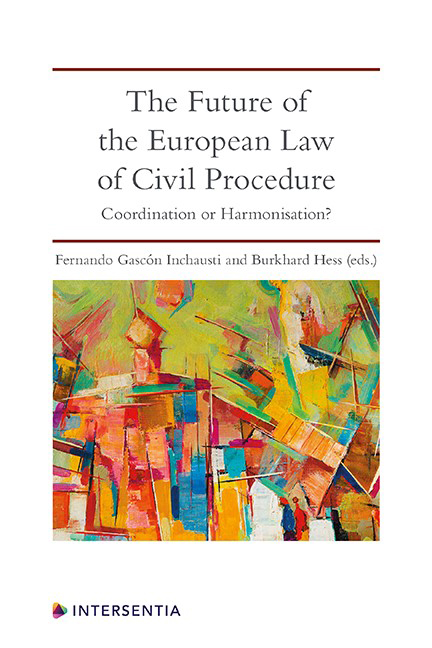Book contents
- Frontmatter
- Contents
- List of Cases
- List of Authors
- Introduction
- PART I METHODOLOGICAL APPROACHES
- PART II THE CURRENT SITUATION: VERTICAL AND HORIZONTAL HARMONISATION
- PART III CURRENT INITIATIVES FOR FURTHER HARMONISATION: The ELI/UNIDROIT Project
- The 2017 Directive Proposal on Common Minimum Standards of Civil Procedure
- Index
- ABOUT THE EDITORS
The ELI/UNIDROIT European Rules of Civil Procedure: Access to Information and Evidence
Published online by Cambridge University Press: 23 July 2020
- Frontmatter
- Contents
- List of Cases
- List of Authors
- Introduction
- PART I METHODOLOGICAL APPROACHES
- PART II THE CURRENT SITUATION: VERTICAL AND HORIZONTAL HARMONISATION
- PART III CURRENT INITIATIVES FOR FURTHER HARMONISATION: The ELI/UNIDROIT Project
- The 2017 Directive Proposal on Common Minimum Standards of Civil Procedure
- Index
- ABOUT THE EDITORS
Summary
BACKGROUND AND PURPOSE
The general topic of this conference as such – the future harmonisation of civil procedure in the European Union – has a rather neutral underpinning. However, the organisers have endowed it with a somewhat ambiguous subtitle: “How far can we go ?“ Depending on the general attitude one has towards harmonisation, it leaves scope for positive and negative connotations alike. Some commentators might fear the impact further harmonisation will have on the national procedural systems and their traditions. Others will hail the advent of new initiatives as a more than welcome thrust of modernisation for old and somewhat rusty civil procedural laws. In that sense, the following chapter does not take a stand. However, it presents something which, in this author‘s view, sets out a possible way forward. The model rules on access to information and evidence described herein off er no less than a full set of harmonised rules, and yet they do not impose themselves like an act of secondary EU legislation would do: they can be seen as a piece of comparative academic scholarship which tries to bring together different perspectives in a coherent and intelligible manner without neglecting the cultural settings in which procedural systems are embedded. In theory, the model rules are ready to be used in any given civil proceedings without major adaptation. At the same time, they may also serve as a source of inspiration for national and supranational legislators alike.
The background is by now well-known: since 2013, the European Law Institute (ELI) and the International Institute for the Unification of Private Law (UNIDROIT) jointly host a research project entitled “From Transnational Principles to European Rules of Civil Procedure.“ It builds on the Principles of Transnational Civil Procedure adopted in 2004 by the American Law Institute (ALI) and UNIDROIT and aims at a regional development of those Principles, which were designed to reduce uncertainty for parties litigating in unfamiliar surroundings and promote fairness in judicial proceedings through the development of a model universal civil procedural code. The first three Working Groups (Service and Due Notice of Proceedings; Provisional and Protective Measures; and Access to Information and Evidence) were constituted in 2014. Close-to-final draft s have already been discussed in the official bodies of both the ELI and UNIDROIT.
- Type
- Chapter
- Information
- The Future of the European Law of Civil ProcedureCoordination or Harmonisation?, pp. 205 - 222Publisher: IntersentiaPrint publication year: 2020



